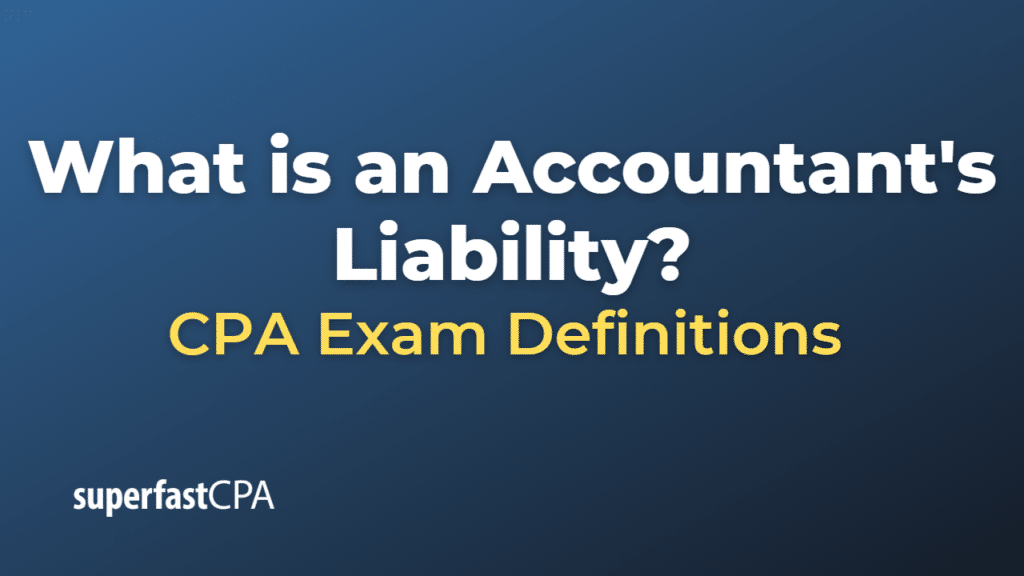Accountant’s Liability
An accountant’s liability refers to the legal responsibility an accountant may face in the course of their professional work. Accountants are expected to adhere to specific standards of professional competence, ethics, and due care when providing services to their clients or employers. If an accountant fails to meet these standards and their actions or inactions result in financial losses, damage to reputation, or other harm, they may be held legally liable for those consequences.
Accountants’ liability can arise from several sources, including:
- Negligence: If an accountant fails to exercise the reasonable care and skill expected of a professional in similar circumstances, they may be held liable for negligence. For example, if an accountant makes a significant error in a client’s financial statements or tax returns, they may be held responsible for any financial losses or penalties that the client incurs as a result.
- Breach of contract: An accountant may be held liable for breach of contract if they fail to fulfill their contractual obligations to a client or employer. For instance, if an accountant agrees to provide specific services within a given timeframe but fails to do so, the client may seek compensation for any losses or damages arising from the breach.
- Fraud or misrepresentation: If an accountant intentionally provides false or misleading information to a client, employer, or third party, they may be held liable for fraud or misrepresentation. This can include situations where an accountant falsifies financial statements, conceals fraudulent activities, or knowingly provides incorrect tax advice.
- Breach of fiduciary duty: Accountants have a fiduciary duty to act in the best interests of their clients or employers and to maintain their trust and confidence. If an accountant breaches this duty by engaging in self-dealing, acting with a conflict of interest, or otherwise prioritizing their interests over those of their client or employer, they may be held liable for any resulting harm.
- Violation of professional standards: Accountants are subject to professional standards and ethical guidelines established by their licensing bodies or professional organizations. If an accountant violates these standards, they may be subject to disciplinary actions, such as fines, suspension, or revocation of their professional license. These actions can also expose the accountant to civil liability for damages resulting from their misconduct.
To minimize their liability, accountants should maintain their professional competence, adhere to applicable laws and regulations, follow ethical guidelines, exercise due care and diligence in their work, and obtain professional liability insurance to protect against potential claims.
Example of an Accountant’s Liability
Let’s consider a fictional example involving an accountant named Susan, who works as an independent tax consultant.
Susan is hired by a client, Mike, to prepare his annual income tax return. Mike provides Susan with all his financial documents, including his income statements, expense receipts, and investment records. Susan, however, is overloaded with work and fails to review Mike’s documents thoroughly. As a result, she makes several errors in the tax return, such as underreporting Mike’s income and overstating deductions.
After filing the tax return, the Internal Revenue Service (IRS) audits Mike’s tax return and discovers the errors. The IRS imposes additional taxes, interest, and penalties on Mike due to the inaccuracies in the tax return. Mike is unhappy with Susan’s work and decides to sue her for the financial losses he incurred as a result of her negligence.
In this example, Susan may be held liable for negligence in her professional work as an accountant. She failed to exercise reasonable care and skill expected of a tax professional by not thoroughly reviewing Mike’s financial documents and making errors in his tax return. As a result, Mike suffered financial losses in the form of additional taxes, interest, and penalties. If a court determines that Susan’s negligence caused Mike’s losses, she may be required to compensate him for the damages he incurred.
To avoid such liabilities, accountants like Susan should maintain their professional competence, adhere to applicable laws and regulations, exercise due care and diligence in their work, and consider obtaining professional liability insurance to protect against potential claims.












